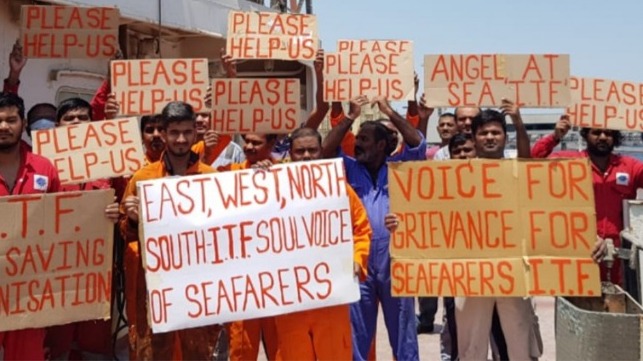After Hunger Strike, Crew of Abandoned Bulker Finally Heads Home

The International Transport Workers' Federation (ITF) reports that the 19 remaining crewmembers of the abandoned bulker Ula will soon be headed home, bringing their two-year ordeal to a close at last. For one crewmember, it will mark the end of a 31-month stay on board.
The Ula was abandoned by her owner, Aswan Trading and Contracting, off the coast of Iran in 2019. Without financial backing or a port of destination, the 25 members of her original crew began to run low on fresh water and food, according to ITF. Their wages went unpaid.
ITF's Middle East coordinator, Mohamed Arrachedi, stepped in and helped to secure some of the crew's wages from the owner. However, the case dragged on into 2020, and the COVID-19 shutdown put efforts to fully resolve the situation on hold. ITF sought to get the crew off the vessel in Kuwait, but Kuwaiti COVID-related restrictions on border movements prevented that course of action. Meanwhile, wage payments became intermittent again.
In October, once Kuwaiti restrictions on movement had lifted, six crewmembers got off the vessel (without back wages) and flew home. The remaining 19 stayed on board, still waiting for their pay.
In January 2021, with no end to the ordeal in sight, the crew launched a hunger strike. With ITF's help, they asked Kuwaiti authorities to pay their wages in the shipowner's stead and help them to fly home. Kuwait declined to help with their pay, but said that it would arrange travel if needed.
The standoff continued until June, when ITF learned that the crew had made an arrangement with the Kuwaiti government and would finally be headed home. The crew's back pay is still in limbo: they must wait on the outcome of a lawsuit seeking to recover their wages. If successful, the ship will be sold and their pay will be returned.
"It’s impossible to relax, to be calm, when you know that the suffering of crews such as these is ongoing," said Mohamed Arrachedi, the ITF's coordinator for the Middle East region. "And we do a good job at the ITF and in our affiliates – but you always want to do more. And you observe the inaction of the parties with interests and obligations towards the crew: how can they do nothing? It’s absolutely unacceptable."
According to ITF, the vessel's open registry flag state declined to take action regarding the seafarers' unpaid wages, despite frequent updates and appeals from the captain.
"Firstly, we have an employer hiding his true identity and ownership in the ridiculous corporate shadows allowed by the [open registry] system, so that he can cut a crew loose and not have to face up to the financial and legal consequences of that decision," said Arrachedi. "Then, we have a failure of the flag state . . . [which] like other flags that are popular with dishonest shipowners, fail to enforce the standards that they are supposed to uphold under the Maritime Labour Convention."
Under the Maritime Labour Convention (Regulation 2.5 – Repatriation) a vessel’s flag state is required to ensure that the crew are repatriated at the conclusion of their contracts, and should step in to do this itself if the shipowner fails to do so or if the crew are abandoned, ITF noted.
"It’s not unreasonable to suspect that financial interests of these flag state registries might have some bearing on their cavalier attitudes to policing shipowners. Many registries are privatized, run for profit, or both. There is an urgent and long-overdue need to clamp down on the irresponsible registries which allow rogue shipowners to operate and treat seafarers like modern-day slaves," said ITF Inspectorate Coordinator Steve Trowsdale in a statement.
